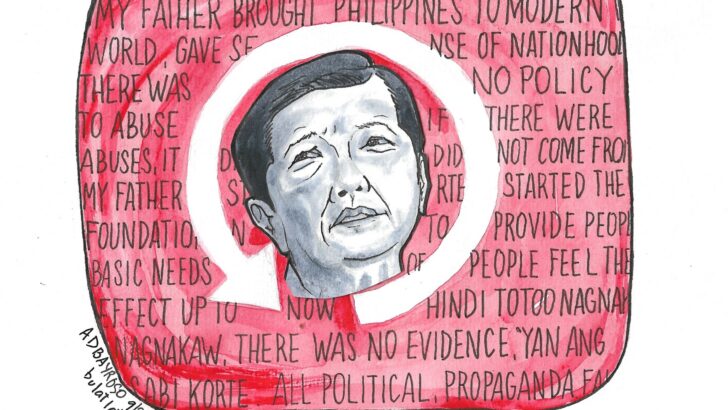
MANILA, Philippines — Presidential aspirant Ferdinand Marcos Jr. and her mother Imelda can be held criminally liable by the Department of Justice and the Bureau of Internal Revenue for willful refusal to pay estate tax.
This, according to retired Supreme Court (SC) Associate Justice Antonio Carpio in a webinar organized by Campaign Against the Return of the Marcoses and Martial Law (CARMMA) held on April 18, the last day of the filing of this year’s income tax returns. Citing the tax code and its implementing regulations, Carpio said that as co-administrators of the Marcos estate, Marcos Jr. and Imelda, have “the primary obligation to pay estate taxes, before any heir including themselves can receive a single centavo from the Marcos estate.”
Marcos’s unpaid estate tax has ballooned to P203 billion ($3.880 billion) including penalties and interests accumulated over the years. The BIR’s principal amount of estate tax assessment of the Marcos estate is worth P23 billion ($4397 million).
Carpio said the interest on the estate tax of the Marcoses started to run from the date the estate tax is due, which is six months after the decedent’s date of death.
“Ferdinand Marcos Sr. died on Sept. 28, 1989, so the estate tax return should have been filed and the estate tax paid on March 28, 1990. But the Marcoses did not file the estate tax return on the date prescribed by law,” Carpio said.
READ: Marcoses continue to rob the Filipino people due to unpaid estate taxes – martial law victims
“The refusal to pay estate tax is willful because almost a quarter of a century has passed since the decision on the estate tax case was declared final and executory by the SC. Still Marcos and Imelda have refused, up to today, (to pay) a single centavo of the estate tax,” Carpio said.
Carpio also said that the Marcoses cannot also avail of the RA 11213 or the Tax Amnesty Act because the law states that: “the estate tax amnesty under this act shall not extend to estate tax cases which have become final and executory.”
The estate tax of the Marcoses had become final and executory when the SC’s third division issued a resolution on March 9, 1999, declaring the entry of judgment of the Marcos’s estate tax assessment case as final and executory.
The Tax Amnesty Act was also enacted on Feb. 19, 2019, said Carpio.
“Final and executory means the case is finished and terminated in the judicial department. And the decision must be forthwith implemented by the executive department of the government,” Carpio said.
The SC decision is also unappealable and can no longer be questioned before any court. No court can also overturn the estate tax assessment of the SC decision, Carpio added.
Carpio said that the claim of Marcos’s camp that the payment of the estate tax was suspended because of an agreement with the BIR and the Presidential Commission on Good Government (PCGG) to wait for the outcome of the case pending in the Sandiganbayan is “utterly false”.
“The BIR denied this. BIR has sent a demand letter to the Marcoses to pay the estate tax,” Carpio said.
People have the power
There is now an ongoing online petition challenging the BIR to file a criminal complaint against Marcos Jr.
Narzalina Lim, co-founder of Alliance of Women for Action towards Reform (AWARE) said they also tried to send the petition to BIR Commissioner Caesar Dulay but they were not entertained.
“We requested an appointment but it only fell on deaf ears. So we printed a copy of the petition and brought it to the BIR,” she said.
As of this writing, the petition was signed by more than 26,000 individuals.
Lim said that comments in the petition also showed how those who faithfully pay their annual income tax returns feel betrayed by the Marcos’s non-payment of their estate tax.
“This is not the time to just send demand letters to a family that has flouted the law for 25 years. Now is the time for the BIR to act decisively and file a criminal case and prosecute Bongbong Marcos, as co-administrator of the Marcos estate, for failure to settle the family’s tax liability. The law provides for it. It can be done. Just show political will and prove that there is justice in this country,” the petition read.
In the last 20 days of the campaign trail, Lim urged supporters to continue to pressure the BIR and also in raising awareness by doing the house-to-house campaign not only of the unpaid estate tax but also because Marcos is a convicted criminal.
READ: A second look at the disqualification case vs. Marcos Jr.
Carpio also reiterated the power of the people, by not electing Marcos Jr.
“We have the power to stop him. If he becomes president he will allow this to lapse. We can stop it. The people can stop it. The power is in our hands,” said Carpio.
Carpio said if Marcos Jr. will be elected, BIR cannot pursue legal action as he would be immune from suit for six years.
In the instance that the prescriptive period lapses, there is a provision in the tax code that says a case can be filed against BIR officials for being negligent in doing their duty, and that negligence allows somebody to violate the law, meaning a taxpayer is freed from liability because the prescriptive period lapsed.
Carpio said that as of now, it has not lapsed because the BIR sent a demand letter to the Marcoses in December last year. It is still within the five years from the last demand letter, Carpio said.
“We are just reminding the BIR officials that there is a law that they can be held liable. If we determined that the prescriptive period lapses because of the negligence of the BIR officials we can sue them. That is the right that we can do,” said Carpio. (reposted by davaotoday.com)










